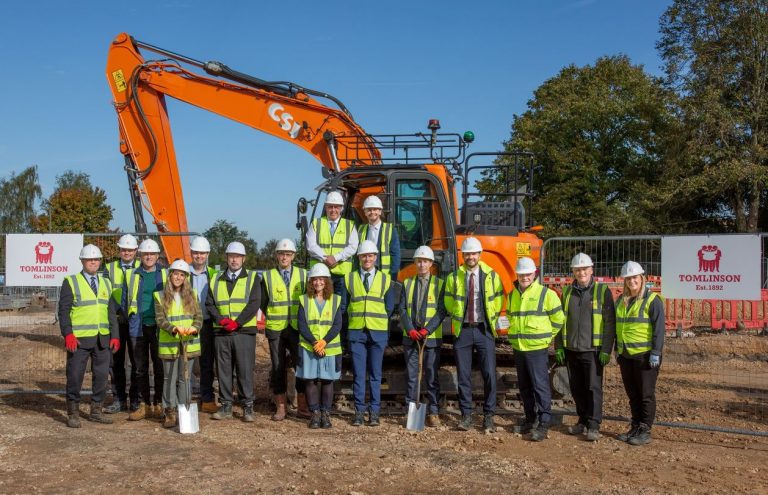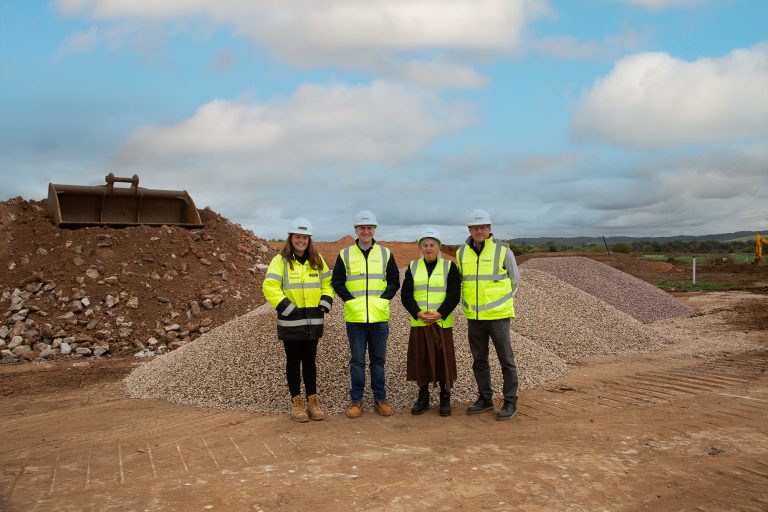Loughborough University has secured approval for a divisive, 552-bed student accommodation scheme.
Construction begins on new family contact centre in Worksop
North Lincolnshire positioned for major AI investment
Northern Lincolnshire is being considered as a potential artificial intelligence growth zone, a move that could make it one of Europe’s largest data centre hubs. The proposed Northern Lincolnshire AI Growth Zone (NLAIGZ), led by North Lincolnshire Council and developer Greystoke, would include several large-scale AI data centres and attract over £20 billion in private investment.
If approved, the project is expected to create 15,650 jobs by 2029, including 14,000 in construction and 1,650 operational roles. The facilities would provide around 2.5 GW of computing capacity—nearly double that of the existing London cluster—and form part of the UK Government’s AI Opportunities Action Plan.
Key locations under review include the A15 Elsham Wolds Industrial Estate and land near the A180 at South Killingholme. The Elsham site has drawn scrutiny from local water companies regarding flooding and supply concerns, though the developer has stated that water-efficient cooling systems will be used.
Officials say aligning AI and data infrastructure with the region’s offshore wind and carbon capture industries could help secure long-term energy resilience, encourage investment in clean power, and promote local use of Scunthorpe-produced steel. If designated an AI growth zone, North Lincolnshire would join national efforts to expand the UK’s digital infrastructure and regional economic development.
£1.8m boost for Nottingham’s cycling and walking network
The East Midlands Combined County Authority (EMCCA) has allocated more than £1.8 million to enhance walking and cycling routes in Nottingham. The investment forms part of a regional effort to improve active travel infrastructure and reduce transport emissions.
Pending approval by Nottingham City Council’s Executive Board, £1.3 million of the funding will be directed toward improvements along Gregory Boulevard between the A60 Mansfield Road and Noel Street. The works are expected to include new pedestrian crossings, upgraded cycle paths, and resurfaced routes linking key education, leisure, and transport hubs such as Nottingham Trent University, Forest Recreation Ground, and The Forest Park & Ride.
The project also aligns with a £2.6 million upgrade to The Forest Sports Zone, which was approved earlier in the year. Combined, these initiatives are designed to strengthen local connectivity, encourage low-carbon travel, and support regeneration across Nottingham’s communities.
A public consultation will precede construction, allowing residents and businesses to provide input on the final plans. Once approved, the scheme will contribute to the city’s long-term objectives for safer streets, cleaner air, and more sustainable transport options.
Leicestershire to host new £35m Centrica Net Zero training academy
Lincolnshire named key training hub in UK’s clean energy jobs plan
The UK government has outlined a major expansion of the clean energy workforce, targeting 400,000 new jobs by 2030. The initiative aims to double employment in renewable, wind, solar, and nuclear sectors to around 860,000 positions within five years.
Among the regions set to benefit, Lincolnshire has been named one of three pilot locations for new “technical excellence colleges.” The Department for Energy Security and Net Zero confirmed £2.5 million in funding for pilot facilities across Lincolnshire, Cheshire, and Pembrokeshire, aimed at training workers in critical trades such as plumbing, electrical work, and welding.
The investment is expected to strengthen Lincolnshire’s clean energy supply chain, supporting local firms involved in offshore wind and solar development along the county’s coast. Regional employers will have access to a broader pool of skilled workers equipped for the growing demands of the energy transition.
The broader strategy includes retraining oil and gas workers, with £20 million in joint funding from the UK and Scottish governments, and new pathways for veterans, ex-offenders, and school leavers to enter the clean energy workforce.
Government data shows average salaries in the sector exceed £50,000, well above the national average. Officials said the plan will boost regional economies, particularly in areas like Lincolnshire that already play a pivotal role in the nation’s renewable infrastructure.
Loughborough University secures approval for 552-bed student scheme
Grainger exits UK market with sale of Cromwell to Aurelius
US maintenance, repair, and operations supplier Grainger has agreed to sell its UK arm, Cromwell, to private equity firm Aurelius as part of its plan to withdraw from the British market and concentrate on North America and Japan.
Based in Leicester, Cromwell is one of the UK’s largest independent MRO suppliers, employing more than 2,000 people and generating over £230 million in annual sales. The business, founded in 1970, was acquired by Grainger in 2015 for £310 million.
Grainger said the decision reflects its shift toward regions where it sees the strongest long-term growth. The transaction remains subject to regulatory approval and is expected to close within the coming months.
The US group anticipates a non-cash after-tax loss of between $190 million and $205 million as a result of the UK exit, with most of the impact to be recognised in the third quarter of 2025.
The divestment follows Grainger’s earlier move to shut down its Zoro UK e-commerce business, marking a continued retreat from the British market as it narrows its focus to higher-performing international operations.
Sherwood Forest MP visits Harrier Park to celebrate regeneration milestone
Bassetlaw regeneration projects make progress
Progress is being made on Bassetlaw District Council’s government funded regeneration projects.
At a cabinet meeting on Tuesday (14 October), members received an update on several major proposed projects including the Priory Centre and the Creative Village in Worksop, and the North Border School site in Harworth and Bircotes.
They also approved funding adjustments within the Local Regeneration Fund following revised government guidance on delivery timelines and fund distribution.
Cllr Steve Scotthorne, cabinet member for identity, planning and place, said: “These proposed regeneration projects show our continued commitment to deliver developments with real benefits for our communities from accessing services, new facilities, and education provision to town centre improvements.
“From the Priory Centre to the Creative Village Heritage building, we look forward to these projects making good progress over the coming months ahead, subject to planning consents.”
The redevelopment of the Priory Centre aims to create a more modern family focused leisure facility including entertainment and shopping alongside improved pedestrian links, public spaces and a new canal footbridge.
It has already achieved milestones including the appointment of a construction partner, with pre-enabling works on utilities scheduled to take place from November onwards and demolition works planned for early 2026.
It follows delays caused by several different factors including a number of conditions attached to the planning approval that needed to be agreed and discharged before any development could begin.
A new Health Hub is also proposed in the Priory Centre, subject to planning, with an NHS tenant identified to take up part of the building, while early designs for the space have also been produced.
Also going through the planning process is a proposal to extend the Creative Village on Canal Road in Worksop with a second phase.
If approved it will create up to ten educational workshop spaces focused on key growth sectors such as construction, green technologies, and logistics. It hopes to raise educational attainment and expand access to high-skilled, well-paid employment opportunities across the district.
Finally, plans for affordable housing to be built on the former North Border School site in Harworth and Bircotes continue, with planning permission for demolition work granted and an additional planning application submitted to clear the full site to prepare for development.
County backs infrastructure and skills projects to strengthen regional economy
Derbyshire County Council has approved a pipeline of projects designed to boost economic growth, infrastructure, and workforce development across the region. The initiatives are supported by funding from the East Midlands County Combined Authority (EMCCA), marking the first significant investment of its kind in the area.
The programme includes strategic transport and infrastructure upgrades, such as Shirebrook access and connectivity and Chesterfield to Staveley regeneration route, improved access to Willington, and A61 corridor works supporting development at the Avenue in Wingerworth. Active travel schemes will promote walking and cycling links throughout the county.
Plans are organised into several growth zones. In the north, projects focus on the Staveley Growth Corridor and Chesterfield’s Spire Neighbourhood. In the south, attention centres on sites near Derby, including New Stanton Park and the redevelopment of the former Willington Power Station. Market towns such as Clay Cross, Swadlincote, and Shirebrook are also set for regeneration and town centre improvements.
Additional funding will support cultural and tourism projects, including canal restorations and the expansion of regional cycling routes.
Economic programmes will target labour and skills shortages through construction hubs, apprenticeship schemes, and training in priority sectors such as engineering, green technology, and advanced manufacturing. Business innovation and rural diversification schemes are also in development.
Cabinet approval will release EMCCA funds for shovel-ready projects and initiate public consultation on those awaiting further investment.












